A packed stopover full of promise for the future
The Race for Water catamaran remained in and around Lima in Peru for two months in order to respond to an intense two-phase programme.
The first 10-day session enabled numerous operations to be carried out, including hosting representatives and other local figures, a “Plastic Waste to Energy” workshop, as well as school visits.
During the second phase over the remaining month and a half, the ACT team, whose objective is to develop plans for plastic waste value chains through waste-to-energy and which is made up of Camille Rollin, Frédéric Sciacca and the local participant from the Peruvian stopover, Jimena Collantes Ortiz, has criss-crossed Peru, participating in conferences and getting involved in a whole series of meetings with those people inspired to take action for a more sustainable Peru.
EDUCATION
This is a key concern in the bid to win the fight against the plastic pollution of our environment and the Foundation is pulling out all the stops. As such, nearly 400 Peruvian children and students were welcomed aboard at the very start of the stopover, to which we must add the hundreds of people encountered during the two conferences given at the UTEC and the PUCP. Every one of them was able to head home with some concrete ideas about the small actions that will make a difference in the struggle against plastic pollution: Refuse a plastic bag or a straw, reuse a product several times, use reusable bottles and bags, repair an object rather than change it, choose the product which has the least amount of packaging, and above all don’t throw anything away into the countryside. The idea is also about making the connection between us humans and the ocean as the source of all life on earth. Indeed, half of the world’s population depends on the ocean to live (and we know how essential ceviche is to the Peruvians!) The ocean is also our main water resource and the largest producer of our oxygen. Without the ocean we simply cannot survive, so why would we want to poison it?
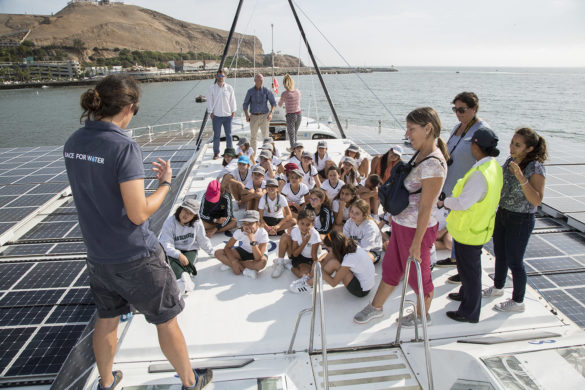
Juan Alberto Wu, President of L+1, a network of social entrepreneurs committed to promoting sustainable development in Peru: “Race for Water’s time with us in Peru has inspired us to seek solutions to the problems that form part of our everyday lives today. Peruvians are privileged to live on diverse land that boasts an abundance of resources. That’s why we need to act with a greater sense of responsibility. Race for Water is a role model… The Foundation’s teams have shown us that living sustainably by combining technology and the resources naturally provided by the planet can be very much a reality. Today, we have the tools at our disposal, it’s down to us to put them to good use.”
WORKING WITH THE GOVERNMENT
For the first time, the ACT team has been able to spend more than two months on the ground, working with numerous decision-makers. The work with the Peruvian government began in 2016. As a result, it is entirely natural that the first event launched by this Peruvian stopover gathered together the members of COMUMA, the multi-sectional committee for environmental management. In this way, several ministries come together several times a year under the governance of the Ministry of the Environment to implement projects linked to the conservation of the environment. The most recent of these took place at the Yacht Club Peruano, the host port for our flagship vessel.
“We’ve been able to focus on the need to take things forward on a legal level regarding the matter of plastic waste and the need to reduce single-use plastic,” explains Camille Rollin.
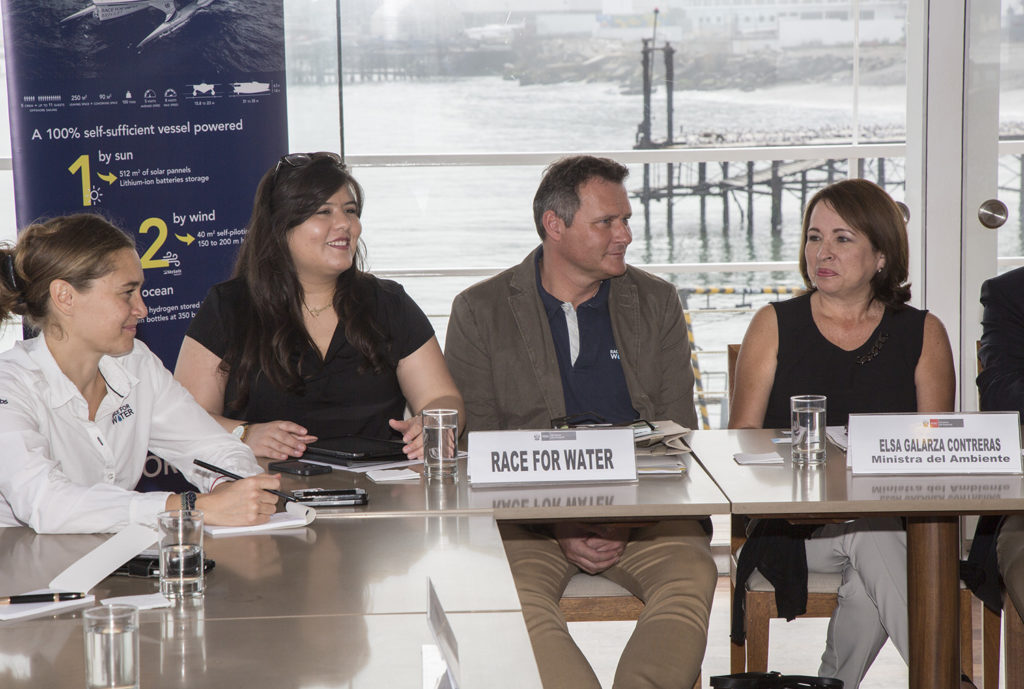
She continues: “Several conference participants also came aboard, enabling us to chat directly with the people writing the latest bills about banning plastic bags. The meetings culminated in an invitation to Congress to be part of the working group dedicated to these bills. In this way, we were able to share our comments and recommendations about their content and their implementation”.

“And, in light of the bill very recently put forward by the MINAM, we’ve seen that our messages have been heard. The ministry is seeking to do more than introduce a blanket ban on single-use plastic bags. Straws have also got a bad press. The expanded polystyrene used for food products also forms part of the list of products to be prohibited. Finally, the desire to call for a percentage of recycled plastic in the manufacture of PET bottles shows that industry is also getting involved in the struggle against plastic pollution. Today, the MINAM is working closely with various conference participants who have proposed bills in a bid to draw up the final draft together, which they hope to put to the vote at the meeting in the coming weeks.”
And she concludes: “Since our arrival, the topic has been covered more and more by the media. Our aim is that the issue with contamination of the water and the oceans as a result of plastics will be a priority for the government. Our last meeting with the new Minister of the Environment gives us a great deal of hope for Peru.”
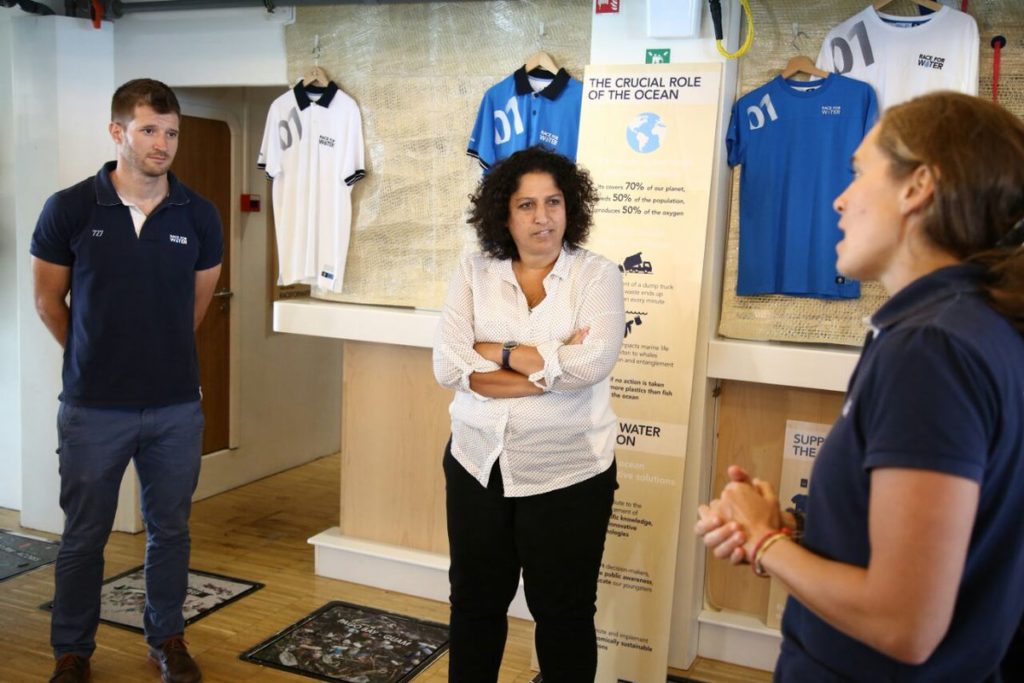
Marcos Alegre – Vice-Minister of the Environment: “The Race for Water initiative is highly relevant because it involves a topic that is of global concern and gets right to the heart of the problem: seeking a new environmental code of ethics, through the use of modern technology to generate energy from materials like plastic…”
WORK ON THE GROUND
Sadly, Peru is no exception to the rule regarding the inability and/or lack of willingness on the part of local and national governments to put in place effective logistics for the collection and processing of waste, the lack of interest on the part of the manufacturers to develop sustainable and recyclable products and the lack of education among populations about how to conserve the environment and manage their waste properly. Too large a proportion of waste, plastic in particular, is left littering the streets and the countryside or is thrown directly into the waterways.
The ACT team’s primary mission is the implementation of a value chain for plastic waste, which will range from providing payment for the collection through to the production of a locally used resource. Indeed, the Race for Water Foundation’s vision is to work at the source of plastic pollution, namely on land, in the cities close to the main waterways or oceans. The conversion of plastic waste into electricity using the ETIA’s high-temperature pyrolysis units, a solution put forward by the Foundation, translates as enabling plastic waste management to be decentralised, providing additional economic channels for street collectors and transforming an environmental problem into an additional energy resource for communities which are often vulnerable, thus limiting the amount of plastic waste thrown away, which all too often ends up spending its long life in our oceans.
As a result, the team was keen to develop a pilot scheme in Peru. Hosting a series of meetings aboard the flagship vessel with business leaders, government entities and NGOs, two regions seem to stand out as potential candidates: Ica and Iquitos. However, projects are also under study in other regions.
The ICA Region first of all, with the support of its governor, Fernando Cillóniz, whose numerous social and environmental projects demonstrate his willingness to make his region a pioneer in the matter.
Frédéric Sciacca: “From the first time we met, Fernando decided to organise a workshop aboard and invite key protagonists from Ica’s private and public sector. The vast majority of the guests accepted the invitation, even though it was sent just 72hrs before the meeting date, and they didn’t think twice about making the 4hr trip to get from Ica to the country’s capital”.
Fernando Cillóniz – Gobernador Regional of Ica: “Our visit aboard the catamaran and the presentation of the Race for Water’s initiatives have had a significant impact on the heart of the Ica region. Since the experience we shared aboard the Race for Water, the environmental commitment of the heads of the region’s management, as well as that of the entrepreneurs and city dwellers, has been further bolstered and is full of hope. A big thank you to the Race for Water teams for the message you have conveyed. We will follow your recommendations and we will make the planet the big winner.”
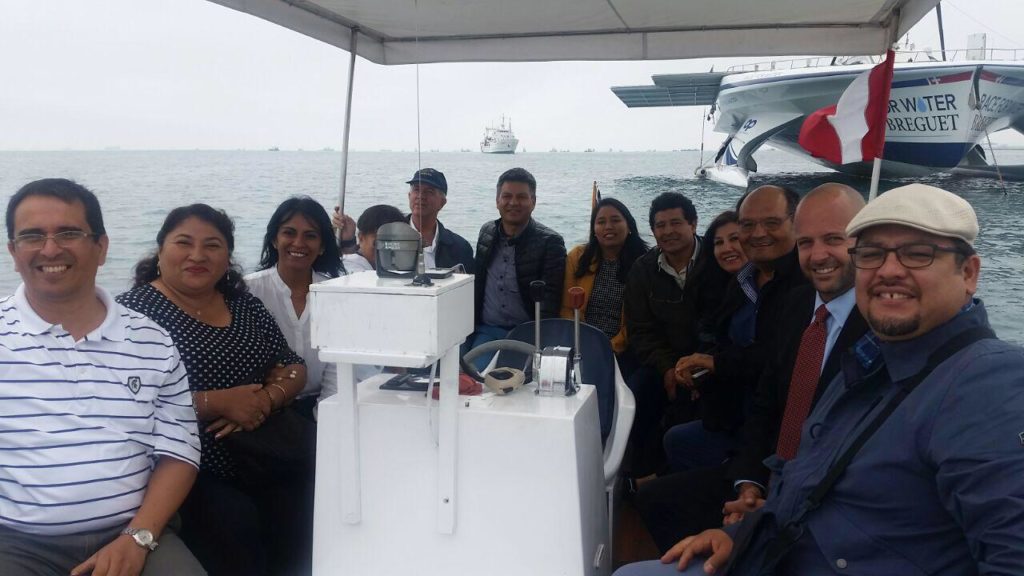
IQUITOS. A symbolic city on the banks of the Amazon, right in the middle of the jungle. Its remoteness further complicates the issue of waste management for a population of nearly 400,000 inhabitants, as does its method of electricity production. Some of its inhabitants from the district of Belen live in wooden houses on stilts and their way of life is dictated by the water levels in the river.
Frédéric Sciacca: “During the rainy season, they get around using a system of wooden tracks and bridges rebuilt each year according to the level the water rises to. The management of waste, water and sanitation is inexistent. Communal toilets are made on stilts and are used by several families. It consists solely of a hole positioned between 4 planks over the river. The domestic waste is thrown directly into the Itaya River, a tributary of the Amazon, the mouth of which is just a few hundred metres away.” “A recent initiative has emerged, through the help of the NGO Ciudad Saludable and the Municipality of Belen: a boat-based collection system. In the space of just two months, you can already see the results. Today, zones that were continuously covered in waste are now virtually litter-free, inspiring many more new families to play the game, holding onto their dustbin bags until the town’s boat calls by. During the dry season, this project should enable the Municipality to partly reduce the time required to clear the waste, which is deposited on the river bed, thus covering the dried-up river bed each year.”
However, the system of bridges prevents access to certain places and the number of boats is not sufficient to cover the whole area. Furthermore, the collected waste ends up like the rest of the municipal waste collected by the town, in an uncontrolled landfill site that pollutes the soil and the groundwater and is a source of global warming.
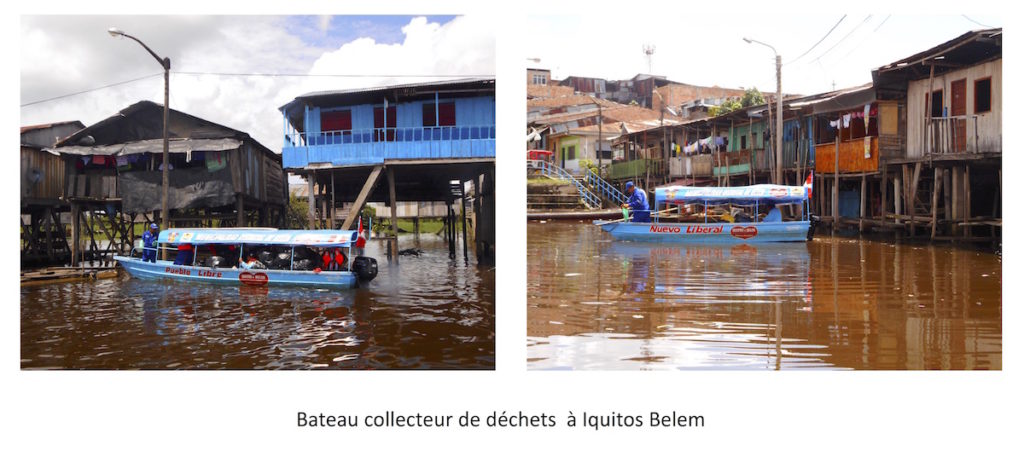
Frédéric: “In the rest of the region, little plastic is collected due to it having no economic value. The necessary export to Lima via boats and lorries is complicated and drastically reduces the price at which a street collector can sell on the material. A local solution involves transforming plastic waste into electricity to guarantee much more stable and higher amounts of pay for the people who do a sterling and essential job in the background, albeit seldom recognised by the rest of the population. Ciudad Saludable and its director Albina Ruiz Rios have been working for the past 30 years doing a remarkable job with the street collectors to give them access to social rights, supporting them in their work and giving them social recognition. They also train them in door-to-door work to educate the population about selective sorting and picking up their recyclable waste. Thank you to Carlos Enrique Aguilar Vasquez for his welcome and for his rather special tour of the city of Iquitos.”
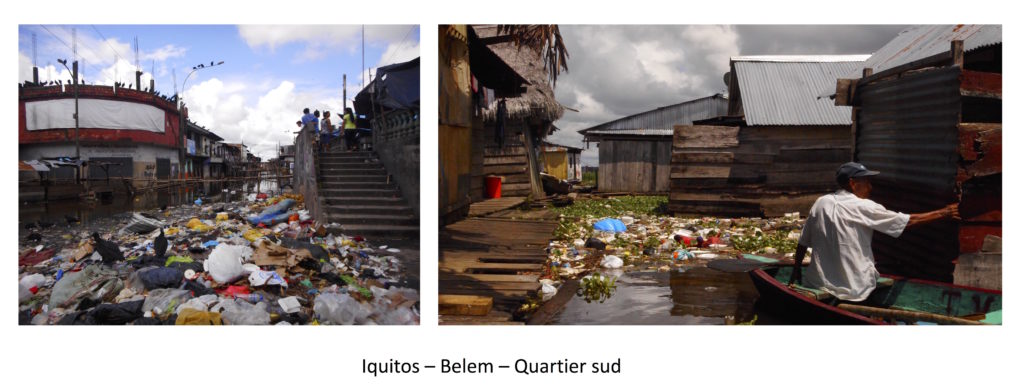
ACT in IQUITOS
Read more about the collaboration agreement
THANK YOU
The Race for Water Foundation’s teams will of course remain in contact with all the different protagonists encountered along the way and they’d like to thank all the entities involved, who helped them throughout the two-month stopover.
“A big thank you to Mikaela Rizo-Patrón and Camila Clausen who form part of L+1, which has helped us a great deal with the organisation of this stopover and enabled some important meetings regarding project development in Peru.
The collaboration with organisations like the Ciudad Saludable and L+1 is key in project development like ours and we hope that the seeds sown during this two-month stopover will enable some great projects to grow up across Peru.
We’d also like to thank Tierra y Ser for their precious contact. This organisation has a fantastic project collecting bottle stoppers to fund wheelchairs for disadvantaged populations. It also puts a great deal of energy into education about recycling.
We must also note the support of several Municipalities including that of Magdalena, which enabled us to meet the street collectors and share a bit of their daily life.
Finally, the Yacht Club Peruano, their fabulous technical teams and the lancheros, who helped us to welcome our guests in the best possible manner and hosted our crew and its boat throughout our Peruvian stopover.
Throughout this stopover, we’ve met lots of people who are motivated to take action for a more sustainable Peru. We’ll leave Lima with the desire to take things further with them and to give concrete expression to the work initiated over two months.”
